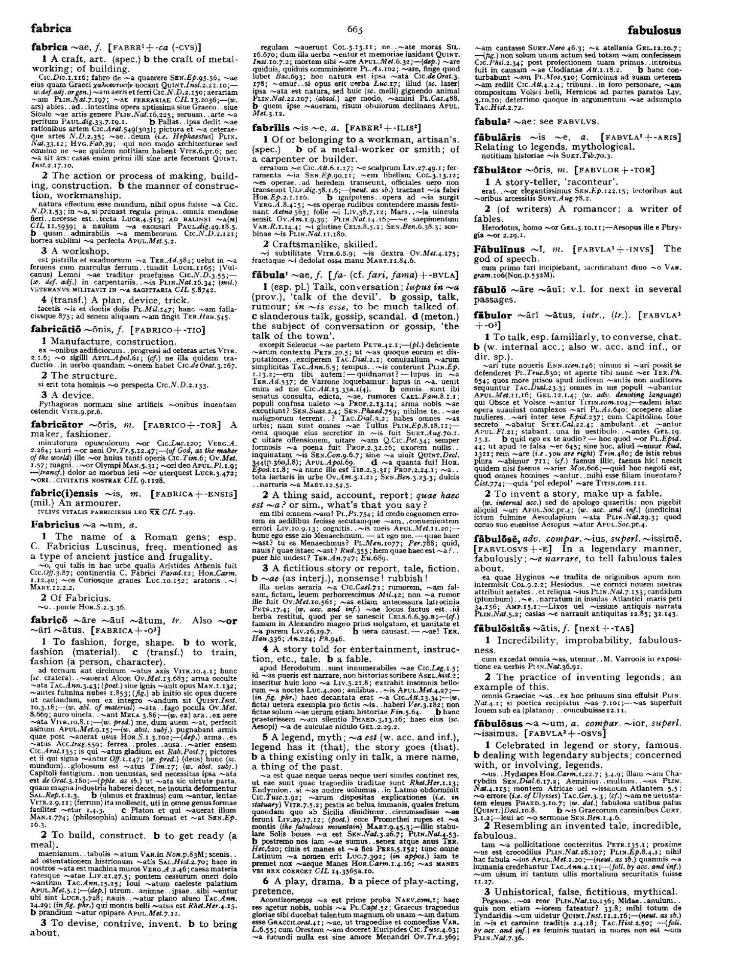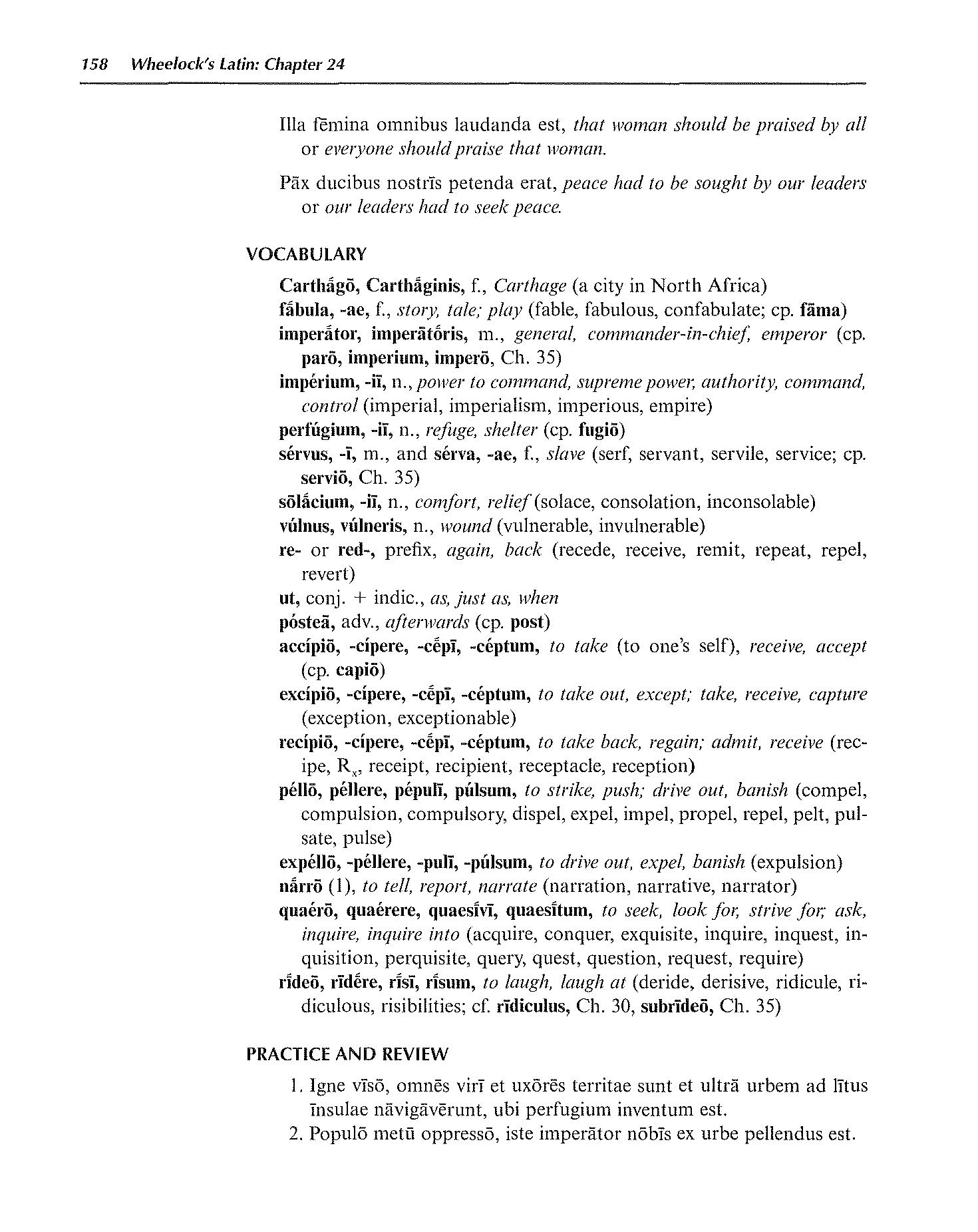
page_listing.tpl
page_subListingDetails.tpl
sub_listingDetails_style1.tpl
sub_listingDetails.title.tpl
fābula tale
fābula is a Latin Noun that primarily means tale.
Definitions for fābula
Wheelock's Latin
Noun
- 1
story, tale, play
English derivatives:
fable fabulous confabulate
Oxford Latin Dictionary
Noun
- 1
(esp. pl.) Talk, conversation; lupus in ~a (prov.). 'talk of the devil'. (b) gossip, talk, rumour; in ~is esse, to be much talked of. (c) slanderous talk, gossip, scandal. (d) (meton.) the subject of conversation or gossip, 'the talk of the town'.
- 2
A thing said, account, report; quae haec est ~a? or sim., What's that you say?
- 3
A fictitious story or report, tale, fiction. (b) ~ae (as interj.), nonsense! rubbish!
Sentences with fābula
Latin to English
Cum in theatro essemus, fabulam Plauti vidimus.Compare When we were in the theatre, we saw a play of Plautus.
Indulge genio, carpamus dulcia, nostrum est quod vivis, cinis et manes et fabula fies. Vive memor leti, fugit hora. hoc quod loquor inde est.Compare Give your genius a chance. Let us gather our sweets! Our life is our own today, tomorrow you will be a dust, a shade, a tale that is told. Live mindful of death, the hour flies, the word that I speak is so much taken from it.
Videor ego fabula aetas perago, nec, tamquam inexercitatus histrio, in extremus actus corruo.Compare They appear to me to have brought the play of life to a close, and not, like unpractised actors, to have broken down in the last scene.
Declension table for fābula
Cactus2000
| Singular | Plural | |
| Nom. | fābula | fābulae |
| Gen. | fābulae | fābulārum |
| Dat. | fābulae | fābulīs |
| Acc. | fābulam | fābulās |
| Abl. | fābulā | fābulīs |
Data sources
Notes
- Definitions
- Frederick M. Wheelock, Wheelock's Latin, 6th ed., rev. Richard A. LaFleur (New York, NY: HarperCollins Publishers, 2005): 158.
- P. G. W. Glare, Oxford Latin Dictionary, Vols. 1-8 (Oxford: Clarendon Press, 1982): 665.
- Word frequencies
- Christopher Francese, "Latin Core Vocabulary," Dickinson College Commentaries, last modified 2014, http://dcc.dickinson.edu.
- Paul B. Diederich, The Frequency of Latin Words and Their Endings, PhD diss., (Columbia University, 1939).
Bibliography
Allen, Joseph H. Allen and Greenough's New Latin Grammar for Schools and Colleges: Founded on Comparative Grammar. Edited by James B. Greenough, George L. Kittredge, Albert A. Howard, and Benjamin L. D'Ooge. Boston, MA: Ginn & Company, 1903.
Crystal, David. A Dictionary of Linguistics and Phonetics. 6th ed. Oxford, UK: Blackwell Publishing, 2008.
Delatte, Louis, Suzanne Govaerts, Joseph Denooz, and Etienne Evrard. Dictionnaire fréquentiel et index inverse de la langue latine [Frequency Dictionary and Inverse Index of the Latin Language]. Liège, Belgium: Laboratoire d'analyse statistique des langues anciennes de l'Université de Liège (L.A.S.L.A.), 1981.
Diederich, Paul B. The Frequency of Latin Words and Their Endings. PhD diss., Columbia University, 1939.
Francese, Christopher. "Latin Core Vocabulary." Dickinson College Commentaries. Last modified 2014. http://dcc.dickinson.edu/latin-vocabulary-list.
Gildersleeve, Basil L., and Gonzales Lodge. Gildersleeve's Latin Grammar: Third Edition, Revised, and Enlarged. 3rd ed. London, England: Macmillan and Co., 1903.
Glare, Peter G.W. Oxford Latin Dictionary. Vols. 1-8. Oxford, England: Clarendon Press, 1982.
Krüger, Bernd. "Latin Conjugation Tables." Cactus2000. Accessed May 5, 2023. https://latin.cactus2000.de/index.en.php.
Pierson, Nick. "Sound of Text." Accessed October 26, 2019. https://soundoftext.com.
Wheelock, Frederick M. Wheelock's Latin. 6th ed. Revised by Richard A. LaFleur. New York, NY: HarperCollins Publishers, 2005.
Wiktionary Contributors. "Victionarium." Wikimedia Foundation, Inc. Updated March 18, 2019. https://la.wiktionary.org/wiki/Victionarium:Pagina_prima.
Citation
Chicago (17th ed.)
Allo Contributors. "fābula, fābulae (n.) - Latin Word Definition." Allo Latin Dictionary. Last modified . Accessed February 20, 2026. http://ancientlanguages.org/latin/dictionary/fabula-fabulae.
Entry created on . Last updated on .







